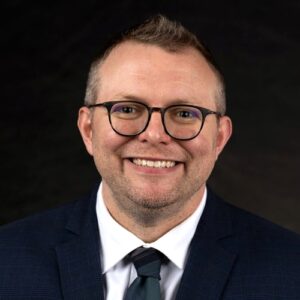
Returning to a Traditional Philosophy Approach: A Series with Dr. Ian Church
Written by Stephanie Gordon
This is part one of the Returning to a Traditional Philosophy Approach Series with Hillsdale’s associate professor of philosophy, Dr. Ian Church.
 Dr. Ian Church, an associate professor of philosophy at Hillsdale College and the director of the Arete Research Center for Philosophy, Science, and Society, believes there is no more pressing time than the present to study logic and philosophy. Since Aristotle, logic has been essential to the task of philosophizing—for helping distinguish good arguments from bad, for helping make sense of the world, and for being clear with language. To Dr. Church, philosophy pursues life’s big questions and brings logical clarity, truth, and order to these conversations.
Dr. Ian Church, an associate professor of philosophy at Hillsdale College and the director of the Arete Research Center for Philosophy, Science, and Society, believes there is no more pressing time than the present to study logic and philosophy. Since Aristotle, logic has been essential to the task of philosophizing—for helping distinguish good arguments from bad, for helping make sense of the world, and for being clear with language. To Dr. Church, philosophy pursues life’s big questions and brings logical clarity, truth, and order to these conversations.
It’s this focus on clarity that first drew Dr. Church to philosophy. Studying philosophy allowed him to see through the postmodern zeitgeist that had enchanted so many other disciplines in the humanities. “I was hooked,” he said. “I loved that philosophy pursued life’s big questions and sought to bring logical clarity and order to a world that so frequently languished in obscurantism masquerading as profundity.”
Originally hailing from Indiana, Dr. Church attended Ball State University in Muncie, Indiana, for his undergraduate education. He remembers his logic professor, the late Dr. Thomas Foster, writing “p or not-p” on the first day of class his freshman year—stressing the point that while such a tautology is a boring truth, it is a universal truth. “Contrary to the relativism that was de rigueur at the time, ‘p or not-p’ is true regardless of who you are or where you are. It seems almost silly to talk about it, but I can’t stress enough how refreshing this was at the time.”
After his graduation, Dr. Church earned his Ph.D. from the St Andrews-Stirling Joint Programme in philosophy. Some of his best friends in graduate school were Hillsdale alumni, so when he saw a job opening in Hillsdale’s Philosophy and Religion Department, he was eager to apply. He came to Hillsdale College in 2016 with his wife, Corrie, and their four children.
“I regularly teach a wide range of classes—including Philosophy of Science, Epistemology, Logic, Early Modern Philosophy, Western Philosophical Tradition, and Philosophy of Language—and I genuinely love them all,” said Dr. Church. “That said, I think Logic is probably my favorite course to teach right now. Since ancient times, logic has helped us distinguish good arguments from bad, and make sense of what we mean when we say what we say.”
Dr. Church said the students make his job joyful. “They’re so very serious, happy, studious, and ready-witted,” he said. “And given my experience teaching at other universities, I know this isn’t the experience of most professors. I consider it a real honor to work with students of this caliber and disposition.”
With over a decade of research grant experience, Dr. Church was tasked with the job of elevating the research profile of the Philosophy and Religion Department and of the College more broadly. “I’d like to think I’ve been successful in that regard; at this point, the total value of the grants I’ve secured adds up to around 40 times my starting salary.”
Dr. Church put Hillsdale on the map when it comes to philosophy with a recent $2.5 million research grant funded by the John Templeton Foundation: the “Launching Experimental Philosophy of Religion” project. Dr. Church is the principal investigator on the project, which is due to run through 2024. The research grant is funding a total of six sub-grants of up to $250,000 each.
“It’s very unusual for small liberal arts colleges to receive major research grants like this, let alone be the hub for new areas of academic research,” Dr. Church said. “I think this project is a real feather in our cap.”
“Experimental Philosophy of Religion” aims to bring the tools and resources of the human sciences to bear on questions and debates within philosophy of religion. During the course of this series, we will learn more about the six sub-grants that make up the project. They include, but are not limited to: Oneness, purpose, free will, and religiosity among cultures.
Dr. Church said the “Launching Experimental Philosophy of Religion” project is especially appropriate for a place like Hillsdale, because in many ways experimental philosophy is a return to a traditional approach to the discipline. Philosophy of religion is currently experiencing a new golden age,” Dr. Church added. “Even so, this ‘golden age’ hasn’t yet seen a return to a traditional, science-engaged approach to philosophy. I hope that the ‘Launching Experimental Philosophy of Religion’ project can help usher in a return to a traditional approach to philosophy.”
Stephanie Gordon, a lifelong Hillsdale native, is the managing editor of the Student Stories Blog. She is married to chiropractor, Dr. Matt Gordon, and has three children – Eloise, Flora, and Jack. When she has a spare moment, she enjoys paleo baking, floating on Baw Beese Lake, and breaking a sweat at the gym.
Published in October 2022
